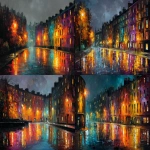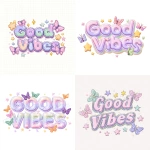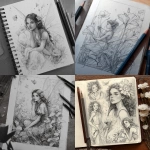Explore the Best AI Image Gallery

Blockchain in Finance: Revolutionizing the Creative Industry
The intersection of finance and technology is constantly evolving, and one of the most transformative innovations in recent years has been blockchain. While widely recognized for its role in cryptocurrencies, blockchains potential extends far beyond digital currencies, offering a decentralized and transparent system that can revolutionize various industries, including the creative sector.
Potential Applications of Blockchain in the Creative Industry
- Copyright Protection and Ownership: Blockchain can provide an immutable record of ownership for creative works, making it difficult to forge or plagiarize content. Artists can timestamp their creations on the blockchain, establishing a verifiable proof of ownership.
- Fair Compensation for Creators: Smart contracts built on blockchain can automate royalty payments to artists whenever their work is used or sold. This ensures that creators receive fair compensation and eliminates intermediaries who often take a significant cut.
- Transparent Licensing and Attribution: Blockchain facilitates transparent licensing agreements, allowing artists to control how their work is used and ensuring proper attribution.
- New Revenue Streams: NFTs (Non-Fungible Tokens) represent unique digital assets, enabling artists to sell fractional ownership of their works or create limited-edition collectibles. This opens up new revenue streams and empowers creators to directly connect with their audience.
Benefits for the Creative Industry
The adoption of blockchain technology in the creative industry offers several benefits:
- Empowerment of Creators: Blockchain gives artists greater control over their work, enabling them to manage copyright, set licensing terms, and receive fair compensation.
- Increased Transparency and Trust: The immutable nature of blockchain ensures transparency in transactions and ownership records, building trust between creators, collectors, and buyers.
- Reduced Costs and Intermediaries: Smart contracts automate processes, eliminating the need for intermediaries and reducing transaction costs.
Ethical Considerations
While blockchain offers significant opportunities, it also raises ethical considerations that require careful consideration:
- Digital Divide: Access to blockchain technology and its benefits may not be equitable, potentially exacerbating the digital divide.
- Privacy Concerns: Blockchain transactions are publicly viewable, raising concerns about artist privacy if sensitive information is inadvertently recorded on the chain.
- Environmental Impact: Some blockchain networks require significant energy consumption, raising environmental concerns that need to be addressed through sustainable practices.
Future Trends
The future of blockchain in the creative industry is bright, with several emerging trends:
- Decentralized Autonomous Organizations (DAOs): DAOs can empower communities of artists and creators to collaborate, make decisions collectively, and manage shared resources.
- Integration with AI: Artificial intelligence can enhance blockchain applications in the creative industry, automating tasks, generating new content, and personalizing experiences.
- Metaverse Applications: Blockchain technology will play a crucial role in building immersive virtual worlds, enabling artists to create and sell digital assets, host virtual exhibitions, and connect with audiences in innovative ways.
As blockchain technology continues to evolve, its impact on the creative industry is only beginning to be realized. By embracing this transformative technology, artists, designers, and innovators can unlock new possibilities, empower themselves, and shape the future of creativity.


](https://images.ai-img.art/thumbnails/150/cf8299cc184c859eff89d17514689e19c7994ad29256a58ad77fa0f7218e2cff.webp)



](https://images.ai-img.art/thumbnails/150/da89993919887fcf2c84af5ec12f2ac997ad0f67c8bf00fecd67ba06a1b3dc49.webp)













](https://images.ai-img.art/thumbnails/150/915b5e50ce61f6219cb8f764d89e2efcb8ad3a9ebd09e0670ae7dc0e2c99a8bd.webp)






](https://images.ai-img.art/thumbnails/150/476665d1452e44d38d5b4fbf5fab4389a6131d55b7bfe8a41d7f65f66b5a9310.webp)





](https://images.ai-img.art/thumbnails/150/aed4d771a0a5b63bed28f6e7183dd4614c5e3e3586d300c8d879ccbb37dbfb4e.webp)







](https://images.ai-img.art/thumbnails/150/78b567a3483191dd52f3d16038b5a926e03e4066d5b301cfff023fb91a962e67.webp)







